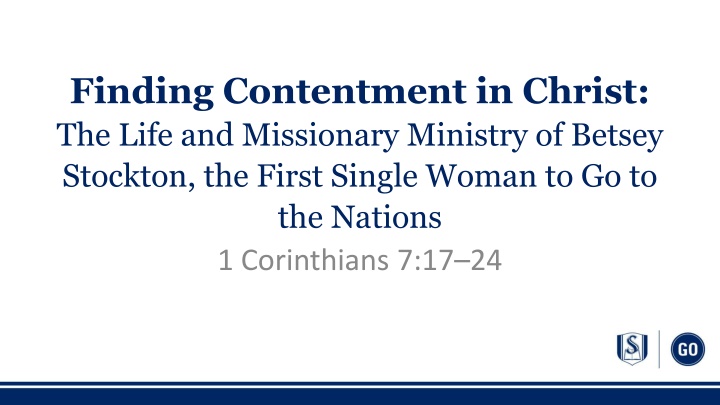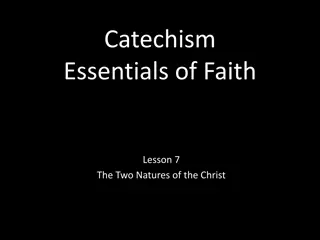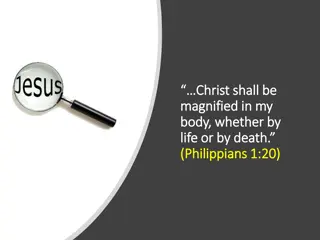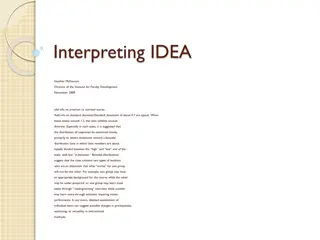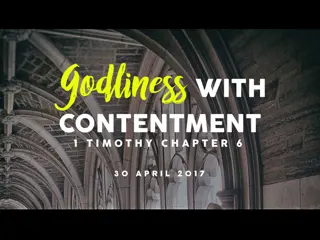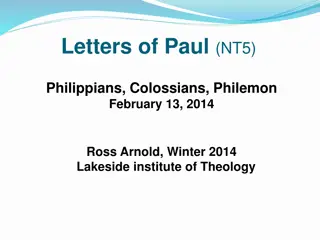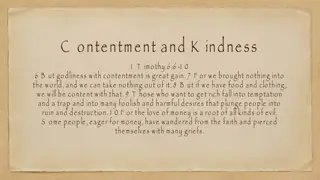Betsey Stockton: Finding Contentment in Christ
Betsey Stockton, a former slave, became the first single woman missionary, leaving America in 1822. Her faith in Christ led her to embrace her assignment and conditions, exemplifying contentment and obedience to God's call. Through her story, we witness the transformative power of faith and the importance of finding contentment in Christ in all circumstances.
Download Presentation

Please find below an Image/Link to download the presentation.
The content on the website is provided AS IS for your information and personal use only. It may not be sold, licensed, or shared on other websites without obtaining consent from the author.If you encounter any issues during the download, it is possible that the publisher has removed the file from their server.
You are allowed to download the files provided on this website for personal or commercial use, subject to the condition that they are used lawfully. All files are the property of their respective owners.
The content on the website is provided AS IS for your information and personal use only. It may not be sold, licensed, or shared on other websites without obtaining consent from the author.
E N D
Presentation Transcript
Finding Contentment in Christ: The Life and Missionary Ministry of Betsey Stockton, the First Single Woman to Go to the Nations 1 Corinthians 7:17 24
Betsey Stockton (c. 1798-1865) A black woman, born a slave She had no idea who her father was, and she was taken away from her mother at a very tender age. She would be converted to Christ in 1816, and leave America for the mission field in 1822 as the first single woman to go to the nations!
As we examine verses 17-24, one word dominates the passage. It is the word call. The word occurs eight times in our English text and nine times in the Greek text. It is properly translated as situation or condition (ESV) in verse 20. Paul will use the word primarily to speak of our call to salvation and identity in Christ. But, he will also use it to speak of our vocation, our condition or situation in life.
I. Be Content in Your Assignment from the Lord (7:17)
Betsey Stockton was born in the world of American chattel slavery. She was a feisty young girl by all accounts. Ashbel Green, a Presbyterian minister who would become president of Princeton University and Betsey s owner said, Betsey gave no evidence of piety, or of any permanent seriousness till she was near 20 years old. On the contrary she was, at least until the age of thirteen or fourteen, wild and thoughtless, if not vicious
Eileen Moffett, a missionary in Korea from 1956-1981 said of Betsey, [Her] maturing Christian faith gradually gave form in her mind a sense of the duty that Christians bear toward the lost of the world the conviction that salvation is found only in Christ. Betsey believed with all her heart that it is the sacred duty of Christians to offer themselves in humble obedience to God s call to carry out his plan of salvation through Jesus Christ for the world.
II. Be Content in Your Conditions in the Lord (7:18-22)
Tom Schreiner: One could be born a slave, sell oneself into slavery to pay debts, be sold into slavery or become a slave by being captured in war. Many slaves lived miserably, particularly those that served in the mines. Other slaves served as doctors, teachers, managers, musicians, artisans, barbers, cooks or shopkeepers, and could even own other slaves. In some instances, slaves were better educated than their masters.
Slaves in the Graeco-Roman world were under the control of their masters and had no independent existence. They had no legal rights, and they could suffer brutal mistreatment at the hands of their owners: masters could beat them, brand them and abuse them physically and sexually. Children born in slavery belonged to masters rather than to the parents who gave them birth."
Senecas observation exposes the evil of slavery: You may take (a slave) in chains and at your pleasure expose him to every test of endurance; but too great violence in the striker has often dislocated a joint, or left a sinew fastened in the very teeth it has broken. Anger has left many a man crippled, many disabled, even when it found its victim submissive. (Ira 3.27.3)
The slavery of pre-Civil War America most readily corresponds to what we read in Exodus 21:16 and 1 Timothy 1:10 ( slave traders ) which the Bible resoundingly condemns.
Letter of commendation to the ABCFM: By me and my wife she was never intended to be held as a slave.
Ashbel Greens Letter of commendation: Betsey is now about 25 years of age, has never been married. Her health, till some time after she returned to live with me in 1816, was remarkably firm and vigorous. Since that, it has been several times interrupted and is habitually delicate; but I think is improving. I have paid her full wages [as] a hired girl, for two or three years past; her services have been so valuable that I shall regret to lose them.
But she had been, for a good while, exceedingly desirous to go on a mission and I am willing that she should. I think her, in many respects, well qualified for this. I hope she is fervently pious. There is no kind of work in a family for which she is not very expert. But I think her well qualified for higher employment in a mission than domestic drudgery. She reads extremely well; few of her age and sex have read more books on religion than she; or can give a better account of them.
She has no small share of miscellaneous reading, and has a real taste for literature. She understands Geography and English grammar, pretty well. She composes her English [in] a manner that is very uncommon for one of her standing in society. She is tolerably skilled in arithmetic. She has made all of these attainments by improving her time and privileges in my family. She calls herself Betsey Stockton.
III. Be Content in Your Relationship with the Lord (7:23-24)
We are prone to think that a change in circumstances is always the answer to a problem. But the problem is usually within us and not around us. The heart of every problem is the problem in the heart Warren Wiersbe
I dont say this out of need, for I have learned to be content in whatever circumstances I find myself. I know both how to make do with little, and I know how to make do with a lot. In any and all circumstances I have learned the secret of being content whether well fed or hungry, whether in abundance or in need. I am able to do all things through him who strengthens me. (Phil 4:11-13)
Michael Osborn wrote concerning her excellent qualifications: I think her pious, intelligent, industrious, skillful in the management of domestic affairs, apt to teach, and endowed with a large portion of the active, preserving, self- sacrificing, spirit of a missionary. From my first acquaintance with her she has expressed a decided wish to go to the heathen. Africa was the place of her choice.
The opposition of her friends has kept her until now. For about a year and a half she has been a member of my class in the Sabbath School at this place. Her recitations have been chiefly from the S[acred] Scriptures, the Larger Catechism, Jewish Antiquities and Sacred Geography. She has a larger acquaintance with sacred history and the Mosaic Institutions than almost any ordinary person, young or old, I have ever known.
(By ordinary person you will understand me to mean such as are not clergymen or candidates for the ministry). I recollected a multitude of instances where, for my own information, I have questioned her about some fact in Biblical history, or some minute point in Jewish Antiquities, and have immediately received a correct answer.
I am of the opinion that few pious young ladies of her age will be found to equal her knowledge of the Bible and general theology.
November 23 Saturday morning at daybreak shipped a sea. The water rushed into the cabin. I saw it with very little fear; and felt inclined to say, The Lord reigneth, let us all rejoice. I was so weak that I was almost unable to help myself. At 10 o clock I went on deck: the scene that presented itself was, to me, the most sublime I ever witnessed.
How, thought I, can those who go down to the sea in ships deny the existence of God. The day was spent in self- examination. This, if ever, is the time to try my motives in leaving my native land. I found myself at times unwilling to perish so near my friends; but soon became composed, and resigned to whatever should be the will of my Heavenly Father.
I believed that my motives were pure: and a calm and heavenly peace soon took possession of my breast. Oh that it were always with me as it is this day!
December 30. Sabbath. I felt something of the love of God in my heart. But still I felt as if I was declining in the spiritual life. I attend a little to the study of the Bible, and find it pleasant. Yet I find a void within my breast that is painful.
February 6, 1823 The weather is beginning to be rather cold. [They traveled all the way down and around South America to go to the Sandwich Islands. The Panama Canal would not be built until 1904-14]. I find my woollen clothes to be very comfortable: my health is very good again a little home sick, but do not wish to return.
O! thought I, if I could but spend one Sabbath evening in your study [of Ashbel Green], how my heart would rejoice. But I must look forward to that Sabbath which will never end there to see, face to face, what we now see dimly through a glass; and to meet you, with my other friends, whom I have left behind.
It is a source of consolation to me to be able to think that you, with many others in my native land, pray for me. Were it not for that, I should almost despair. I find my heart more deeply corrupted than I had any idea of.
I always knew that the human heart was a sink of sin, and that mine was filled with it; but I did not know, until now, that the sink was without bottom. I attribute much of my spiritual difficulty to the want of retirement and prayer.
Ah! how soon may the people of God grieve away his Holy Spirit. But why should I thus complain and despond. He is still my Father and my God and I still love him Yes, my balm is still in Gilead, and my physician there.
February 8 Here you will indulge me with a passing reflection. I have always remarked, that in the most dangerous situations, I have felt the easiest; and it was because I did not know my danger. And can there be any thing more like a sleeping Christian, or an unawakened sinner? both in imminent danger, and both stupid. O that God may save me from spiritual, as he has in mercy from the natural evil.
But hitherto has the Lord helped me, and I can raise upon this much dreaded landmark, a strong and lasting Ebenezer. Long, I hope, shall I remember the mercy of my God here. Here too the Spirit of the Lord has, I trust, been striving with some of the sailors, though many are yet, I fear, in the gall of bitterness; some, however, are rejoicing in the Lord.
How would your heart rejoice with us, could you see these hardy sons of the ocean, who would scorn to complain of any earthly hardships, bowing with the spirit of children, at the cross of Christ.
March 24 The morning was pleasant, but I could not enjoy it I was wretched I could not enjoy my friends, because I could not enjoy my God.
March 29 The appearance of the crew has not been so favourable to- day as it was last Saturday. The strong man armed is keeping his palace; but blessed be God there is a stronger than he. Oh! that it would please him to come down and show his power amongst us.
March 30. Sabbath. Alas! how unlike those Sabbath mornings I have spent beneath your roof [Ashbel Green], where all was quietness and peace . But I am indulging myself too much in such recollections. I would not, I could not, I dare not, look with longing eyes towards my native land.
No sir, my hand lies on the plough, and if my poor wretched heart does not deceive me, I would not take it off for all the wealth of America. It is not the leeks and the onions of your land that I long after, but It is spiritual food I want.
April 24 On the 24th, of April, we saw and made Hawaii (Owhyhee) . it was not long before objects that were calculated to have a chilling effect of another kind, were brought to our sight. Two or three canoes, loaded with natives, came to the ship: their appearance was that of half man and half beast naked except a narrow strip of tapa [cloth made from the bark of the paper mulberry tree] round their loins.
When they first came on board, the sight chilled our very hearts. The ladies retired to the cabin, and burst into tears; and some of the gentlemen turned pale: my own soul sickened within me, and every nerve trembled. Are these, thought I, the beings with whom I must spend the remainder of my life! They are men and have souls was the reply which conscience made.
I brought my little boy (the Stewart son) on deck, who was two weeks old; some of them took him in their arms, and in ecstasy exclaimed, aroha maitai very great love to you; and kissed him. The last expression of affection we could have dispensed with very well; but we have to become all things to all men, that we may gain some.
Betsey and the Stewarts would begin work immediately. She and the Stewarts went to open a new station at Maui where Betsey would establish a school for 10 youth, the first of its kind. In 1824 the mission on Maui opened a school for the education of the local chief s servants and family. Betsey Stockton was the first teacher.
Her life was hard and lonely. However, Betsey would write, Though sorrowful, yet I rejoice. The missionary s sorrows and the missionary s joys are mine. The missionary s grave, and perhaps the missionary s heaven, will also be mine
1828-1830: Betsey is hired by the Committee for the establishment of a coloured Infant s school in this city, the city of Philadelphia. She would serve as the principal and head teacher. It was the first of its kind.
July 30, 1829: Betsey would again leave America for mission work in Grape Island, Ontario, Canada. She would teach and help set up the structure of a mission school at Ojibwa. She would instruct the native Indian children.
Gregory Nobles writes of her work, Within two months, the fruits of Stockton s work were apparent She came for the purpose of setting up an Infant School, which has succeeded admirably and other teachers across the region would build on her success well into the 1830s * *The Education of Betsey Stockton
September 6, 1830: Harriet Stewart dies. Betsey takes over the personal and direct care of the Stewart s three children and takes them to Princeton. Charles Stewart graduated with highest honors at the head of his class in the military academy at West Point and went on to a distinguished career as a brigadier general. * He was like a son to Betsey and she was like a mother to him * Betsey Stockton: Pioneer American Missionary
1835-1865: Betsey lives in Princeton for the remainder of her life. She opened and served as principal at a public (or common ) school for black children. She served with great distinction for many years * * Betsey Stockton: Stranger in a Strange Land
1835-1865: She led in the formation of the First Presbyterian Church of Colour of Princeton (later renamed Witherspoon St. Church). She helped found a Sabbath school connected to the church for children and young people and would faithfully teach for 25-30 years.
1835-1865: She persuaded a student at the seminary in Princeton, Lewis Mudge, to open a night school for young black men and women who were employed during the day.
